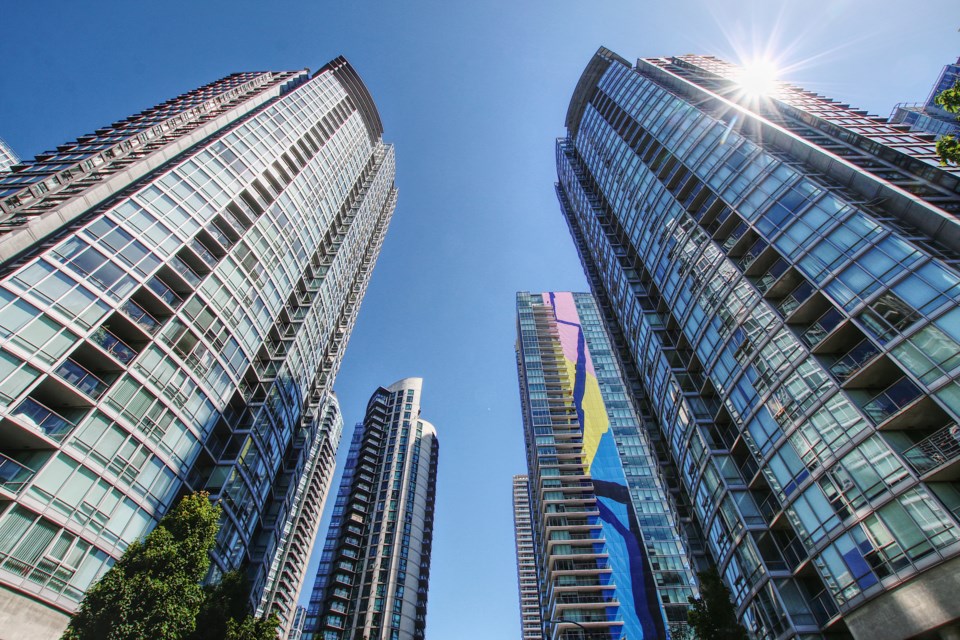Vancouver real estate is being pulled in different directions by an interplay of economic, political and technological forces, a recent conference was told.
More than 1,400 industry leaders gathered in Vancouver late last month to hear a series of speakers and panels discuss the whirlwind of factors affecting the region’s real estate markets — from the impact of trade action and tariffs led by U.S. President Donald Trump, to changing demographics and capital flows, to the industry’s uptake of artificial intelligence tools.
According to Milos Dajic, head of Canadian investments with Oxford Properties Group, the outcome of Canada’s recent federal election matters less than the country’s “critical policies” regarding immigration, taxation and the cost of doing business.
“I’m not sure the world really cares about our election all that much,” he said. “We’ve got to get our ducks in a row, figure out who’s going to lead and then what kind of legislative changes are going to come from that, and then we can go out and sell that to the world.”
Canada rejects foreign capital to quench thirst
With Canada-U.S. relations at a nadir, private wealth in both countries may now lose out on opportunities for diversification across the Cascadia region, with capital receding on both sides of the border, says Jim Costello, head of real estate economics with MSCI Inc.
A retreat of global capital from the U.S. could also have repercussions in Canada and locally, such as by potentially creating pockets of hot air amid a flight to safety, he said.
“If global investors are sidelining the U.S., where does that money go? It has to go someplace,” Costello said.
“The thing I’m really worried about: Does that money find its way into other asset classes in search of safety?”
B.C. may not necessarily benefit from pent-up capital. Capital from American investors, sovereign wealth funds and other sources is being turned away at the doorstep, said Avi Tesciuba, senior managing director, country head, Hines Group.
Tesciuba said that in addition to the federal ban on foreign investment in residential real estate in Canada, there is a B.C. tax of 20 per cent on investing in development land.
“That essentially means they can’t be competitive, and it essentially means that they cannot invest here, so it writes off foreign capital altogether,” he said.
On one hand, he noted, the City of Vancouver and the province have pushed for greater densification, particularly around rapid transit. On the other, they have pushed back against foreign capital.
“The net result of that is that … housing will get more expensive,” Tesciuba said.
Tech and AI disrupting real estate
Ebbing capital flows are not the only way real estate markets are changing. Technology and AI are also responsible for tectonic shifts, speakers told the recent Vancouver Real Estate Forum.
In his remarks, author and futurist Dror Poleg said AI is contributing to a larger transition toward intangible assets, whose performance can be highly volatile, akin to box office revenues varying widely for very similar Hollywood films.
With technology demanding more flexible and distributed networks, “maybe it means the whole world will become one big WeWork,” he said.
“We’ll see lower total demand for office business. The centrality of offices and cities will gradually go away, and the demand for almost everything else will be much less stable than it has been historically, so our ability to plan ahead is diminished,” he said.
In this context, Poleg said commercial real estate is evolving.
“Commercial real estate is no longer a bond-like asset, and institutional investors will increasingly not look at it as a bond-like asset when they decide how to allocate to it,” he said.
The sector will instead be treated more like an operating business. Over time, the market will have less of a concentrated centre and fewer big winners, he predicted.
On a more hopeful note, Poleg said building owners can use software and AI tools to improve and monetize the user experience.
“Any asset, anywhere, can now become more valuable than it has ever been,” he said.
“You can attract people with stories and software. You can extract more value with all sorts of new tools. Out of every interaction you can put a price on it, you can add layers to it and make it more experiential.”
Demand driven by changing demographics
The province is also facing “unprecedented” population trends, according to Andrew Ramlo, vice-president of advisory with Rennie & Associates Realty Ltd.
Due to the previous federal government’s decision to limit immigration, the B.C. Ministry of Finance is forecasting two years of population decline, he said.
“Not during the Second World War and the onslaught of the Spanish Flu pandemic, not during the Great Depression, not during COVID-19 pandemic, have we ever, ever seen our population decline on an annualized basis in Canada, let alone being engineered from the policy side of things. This is unprecedented,” Ramlo said.
Still, the next two decades are expected to bring significant population growth to B.C., even with lower immigration targets and greater interprovincial migration to more-affordable Alberta, Ramlo said.
The result will be significant housing demand locally.
“We’re well below where we should be in terms of adding supply, even with these wacky immigration targets that we saw from the federal government,” he said.
In the Lower Mainland, Ramlo said he expects the population to grow by 20 to 30 per cent — or 700,000 to 1.1 million people — over the next 17 years. In real estate terms, this growth would require 500,000 to 600,000 net new homes — the equivalent of adding one City of Surrey’s worth of people at the low end, or the population of present-day Surrey and Richmond, in the middle of the range.
“Really significant population and housing growth [are] required to come alongside that to accommodate folks,” said Ramlo.




